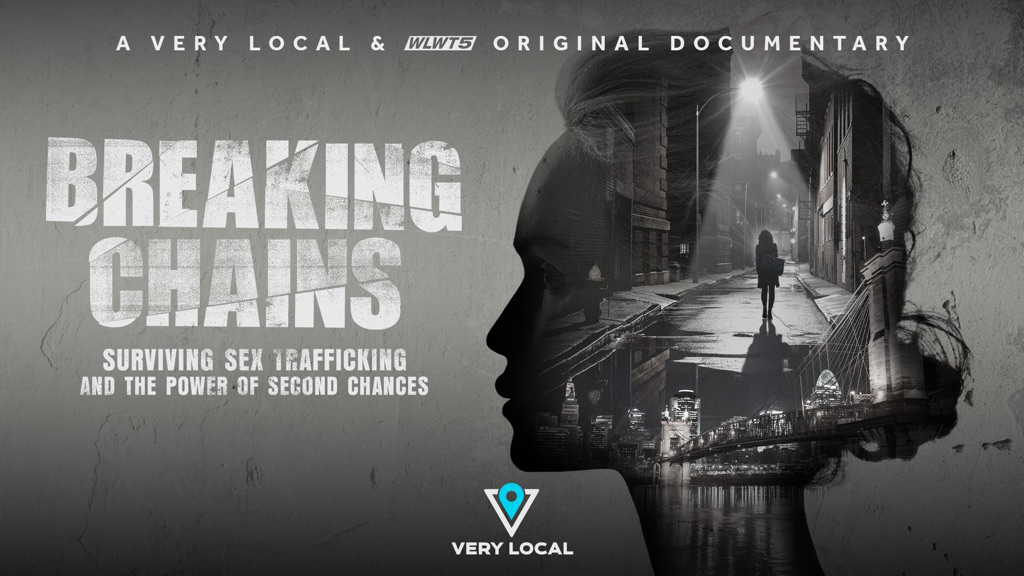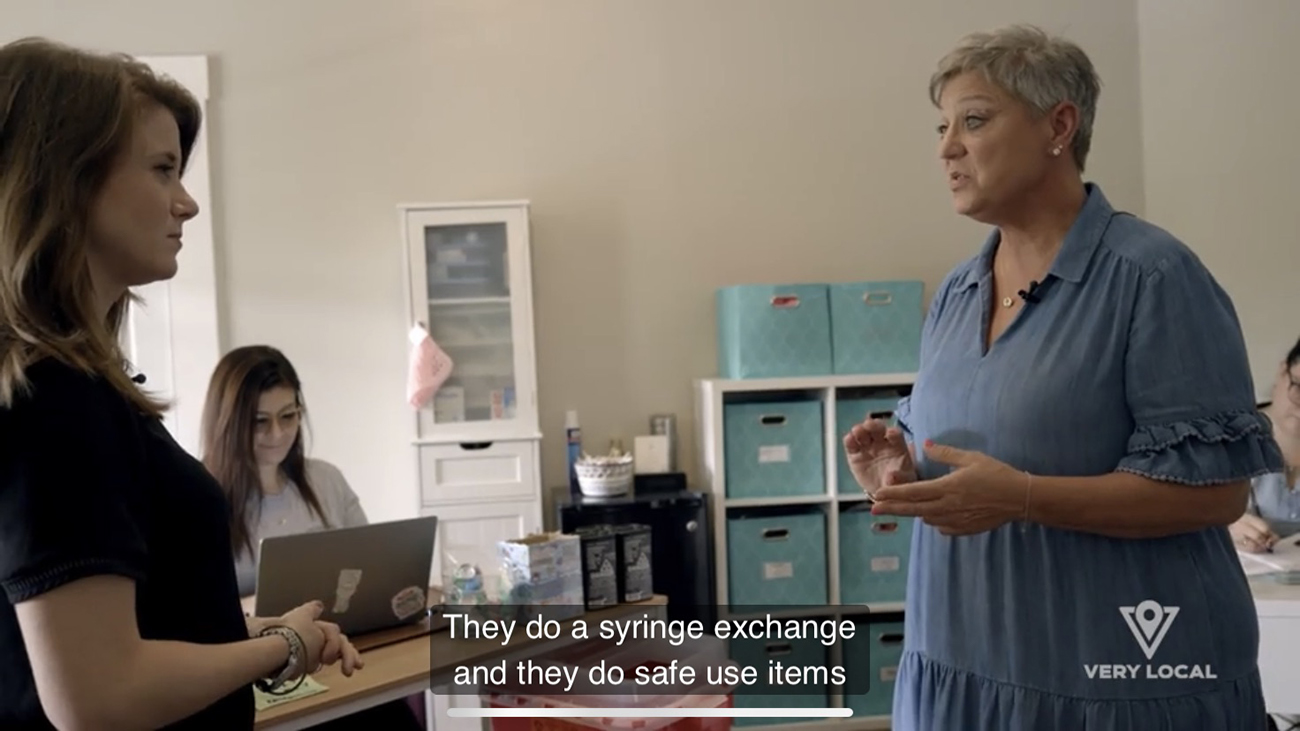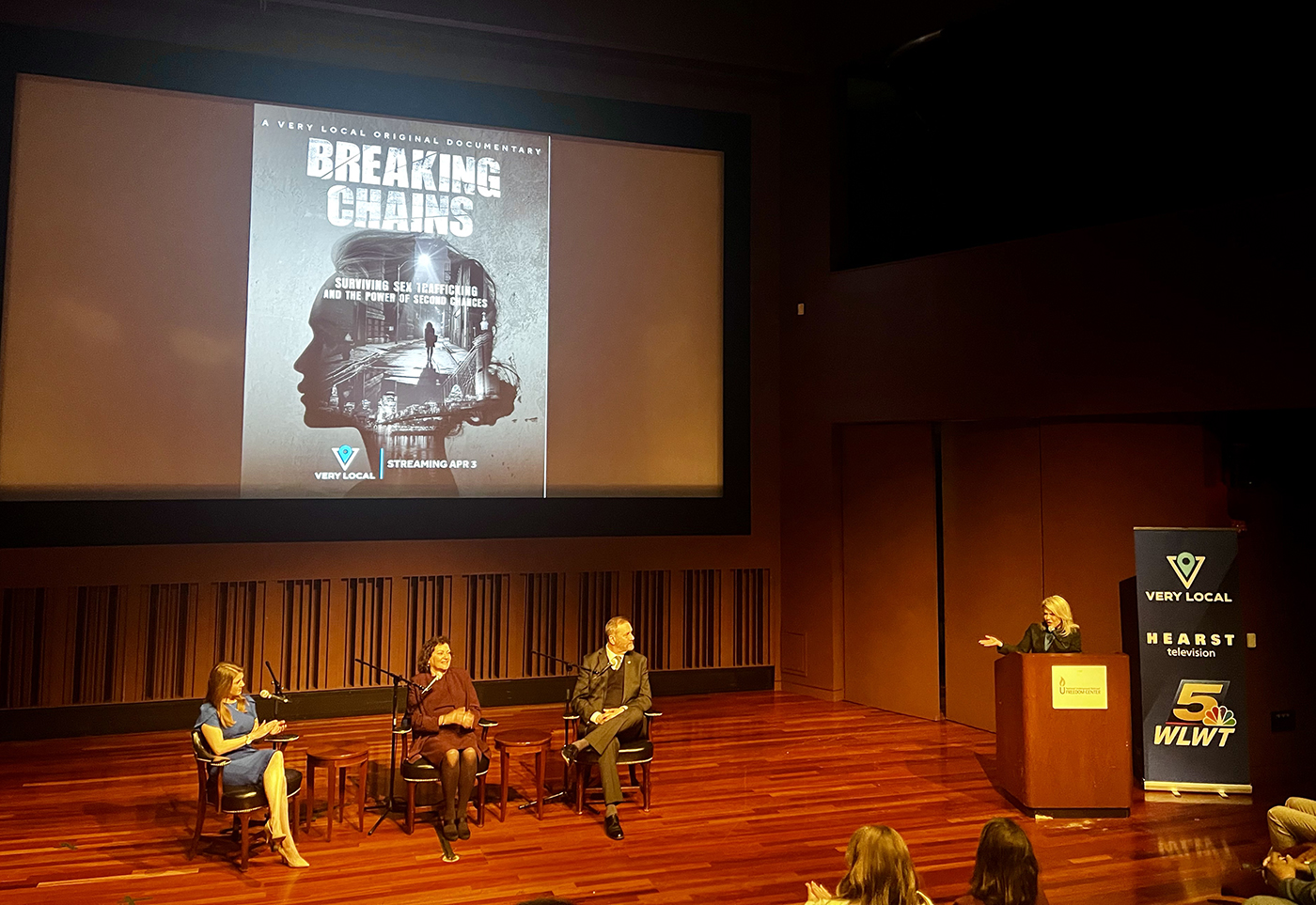In the powerful 22-minute film “Breaking Chains: Surviving Sex Trafficking and the Power of Second Chances,” the Elon University alumna brings audiences face-to-face with the grim realities of human trafficking in Cincinnati and the inspiring resilience of those working to combat it.

For Meredith Stutz ’16, Cincinnati is undeniably home.
The Elon alumna grew up on the northern bank of the Ohio River, graduating from Cincinnati Hills Christian Academy and embracing the city’s loyalties as her own. This meant afternoons cheering on the Reds and Bengals and a healthy affinity for Graeter’s black raspberry chip, the hometown ice cream synonymous with Cincinnati since Ulysses S. Grant held presidential office.
After four productive years at Elon, where she conducted international reporting in Ireland and an internship with “60 Minutes,” the broadcast journalism major began her reporting career with stops at news outlets in Savannah, Georgia, and Winston-Salem. Along the way, she used her warm, inviting disposition to connect with community members, while remaining the consummate professional, unafraid to investigate difficult subjects.
Then, in 2020, as the world was reeling from the pandemic, Stutz was unexpectedly extended an offer for her dream job back home. She landed at WLWT News 5, Cincinnati’s NBC affiliate, as a full-time morning reporter charged with informing her hometown community. It was the ideal fit for Stutz, reconnecting her with family and the city she grew up loving. Mic in hand, she covered the city’s biggest stories, ranging from the region’s pandemic response to Damar Hamlin’s cardiac arrest during an NFL game. There was even some fun mixed in.
Yet, there are other stories – and truths – about Cincinnati that cast a shadow, which Stutz saw firsthand. The city serves as a transportation hub, located at the crossroads of I-75, I-71 and I-74, which brings both advantages and challenges. The region, like many, has endured economic hardship, with people living in poverty, particularly women and children. Ohio has also been heavily impacted by the opioid and drug crisis. Mix in the city’s reputation as a destination for major sporting events, concerts and conventions, and these conditions help sex trafficking flourish.
This exploitation of some of Cincinnati’s most vulnerable residents troubled Stutz deeply – and put her into action.
“Something that really motivated me as a journalist is, let’s not just talk about the problems, let’s be about the solutions,” Stutz said. “I, as a journalist, can tell you about all the bad news happening in the world. But being in a local news setting, I’m not just a journalist, I’m your neighbor, too. So, what are we doing about it?”
So, what did Stutz do?
In collaboration with her WLWT colleagues, she oversaw the production of a compelling documentary, titled “Breaking Chains: Surviving Sex Trafficking and the Power of Second Chances,” taking viewers deep into the heart of Cincinnati’s trafficking issue. The film reveals the realities and resilience of those fighting to end sex trafficking. The film premiered in April in downtown Cincinnati at the National Underground Railroad Freedom Center and provided an intimate look at the lives of trafficking survivors and the dedicated advocates working tirelessly to help others.

A place to feel safe
Trafficking often hides in plain sight. It’s driven not just by physical bondage but also by addiction, coercion and manipulation. Stutz’s documentary tackles this layered reality, revealing the complexities that make it difficult to break free – and stay free.
“Can I take you to a hotel where trafficking is happening in Cincinnati?” Stutz said. “Yeah, I saw these properties for myself.”
This is a harsh reality the Elon graduate came to discover as both a reporter and a Cincinnati resident.
When she returned to Ohio, Stutz re-immersed herself in the community and began volunteering at Weightless Anchor, a nonprofit organization run by BLOC Ministries. The daytime hospitality home serves women stuck in the cycle of survival sex, substance abuse and homelessness, providing essential services such as clothing, hot showers, laundry, healthcare, and harm reduction resources.
LeAnn Sanson, director of Weightless Anchor, recalled that Stutz began volunteering on Thursdays, and that the Elon alumna quickly found her footing.
Like most volunteers, Stutz was tasked with one of three responsibilities: greeting guests, helping the kitchen serve meals, or assisting visitors in the clothing room and showers. This support could include helping select an outfit or ensuring that visitors had the hygiene products they needed.
“In these roles, it’s about building relationships with the women,” Sanson said. “Making them feel safe and loved as they come in.”
Stutz moved easily among the guests and her fellow volunteers, Sanson noted. She rolled up her sleeves and helped where she could, contributing to the organization’s supportive environment. Most visitors were unaware that Stutz worked in the media – and those who found out were often surprised.
“Meredith has that Southern charm,” Sanson said. “I don’t know if Cincinnati is considered Southern, but she has a Southern charm to her. The women absolutely loved her.”
One of Stutz’s early revelations was that trafficking takes many forms, thanks in large part to the impact of drug addiction and abuse.
“Are there girls being chained up and held against their will? Yes, absolutely,” Stutz said. “But there’s also coercion, and the use of fear and addiction. There are drug suppliers who will push women to prostitute herself to feed their addiction. That, too, leads to trafficking. So, in a way you can even traffic yourself, which is a new revelation for a lot of us.”
Addressing the general public’s lack of awareness about human trafficking requires time – far longer than a 90-second news hit. As luck would have it, Hearst Television, Stutz’s employer at the time, offered such an opportunity.

Building awareness and trust
The idea for “Breaking Chains” traces back to a company email promoting a competition within Hearst Television, which invited pitches for documentaries to be featured on the media conglomerate’s Very Local streaming platform.
With nearly three dozen news stations in Hearst’s network, spanning from Sacramento, California, to Portland, Maine, the competition would be fierce. But the opportunity was too great to pass up. Stutz teamed with her colleague Austin Maynard, WLWT’s chief videographer, to submit an application focused on individuals stuck in the snares of sex trafficking in Cincinnati and the supporters helping them reclaim their lives. Their entry won.
“An opportunity to create a full-length documentary in the local news world is astoundingly unheard. Most days, you’re given 30 to 90 seconds to tell an entire story,” Stutz said. “This was a real chance to look at what people are doing about sex trafficking, touching on some of the darkest parts of our society. You need a significant amount of time to tell that story, otherwise you feel like victims and survivors aren’t given the space that they need.
“It’s that crossroads of hope and heartbreak where my teammate, Austin, and I decided that we wanted to pitch our tent and create our documentary.”
The duo set out to connect with survivors, as well as women who are currently being trafficked. Stutz knew full well these interviews and subsequent conversations would be difficult, and that they would need to be treated with great care.
“Talking to survivors and gaining their trust is a delicate process. You’re not just there for a soundbite; you’re there to tell their stories in a way that offers dignity and respect instead of cyclical exploitation.”
Meredith Stutz ’16
To produce a documentary about trafficking required a commitment to trust-building. Stutz worked closely with Weightless Anchor and built connections with Women of Alabaster, another women’s advocate group in the region. Stutz set out to form relationships with nonprofit organization leaders, ministry leaders and judges, who for obvious reasons can be protective of victims and survivors.
According to Sanson, Stutz’s familiarity with the women she interviewed allowed for an authentic portrayal of their experiences, giving a voice to those who are often marginalized. Sanson commended Meredith’s approach, noting her humility and dedication to the women she interviewed.
“To the women she spoke to, she wasn’t just a reporter,” Sanson said. “She wasn’t someone who saw an interesting story. Meredith had relationships with the women she interviewed, so they were willing to open up and share their stories.”
With support from the WLWT and Very Local staff and leadership, including David Seals, the station’s programming and community affairs director, Stutz and Maynard dedicated much of 2023 shooting, writing, editing and rewriting their documentary.
One of the documentary’s focal points is the Hamilton County CHANGE Court, an innovative two-year program offering a judge-supervised treatment plan for those facing prostitution or related charges.
“A lot of the women we talked to said that CHANGE Court was their lifeline,” Stutz said. “It offers not just sobriety, but the chance to build a stable life with a job, housing, and a support network. It’s about breaking the cycle and giving these women the tools to stay free.”
The expungement ceremonies by Judge Heather Russell, who oversees the program, can be particularly powerful. “Watching women receive a clean slate after years of being entangled in the system is indescribable,” Stutz said. “It’s a tangible symbol of mercy and grace.”

Inspiring action
During one interview for the documentary, Sanson recalled Stutz asking a survivor what she’d want the world to know about her. The victim solemnly replied that she hoped that others understood that she was not a bad person.
This sentiment, shared by many survivors, reinforces the need for supportive services rather than punitive measures, Sanson explained, and that addressing sex trafficking requires compassion and understanding.
“It’s important to know that sex trafficking doesn’t just happen to one type of person or one type of demographic,” Stutz said. “And something that I’ve observed over the past years is that if you’re looking for sex trafficking, you do not need a passport. It is happening in your own city and in your hometown.”
Stutz said her team was deliberate in their filmmaking, seeking to inspire viewers, while also making them uncomfortable. That discomfort could lead to important realizations, resulting in real change.
“I hope this documentary doesn’t just leave people with feelings,” Stutz said. “I want it to inspire action – whether it’s supporting local ministries, raising awareness, or volunteering. I want others to know they can help these victims and survivors in their own communities.”
The documentary is now available for free on the Very Local streaming platform. Download Very Local for free on Roku, Amazon Fire TV, or any mobile device.
EDITOR’S NOTE:
At the conclusion of 2023 – and her contract – Stutz left WLWT to serve as senior communications consultant at UC Health. In her new role, she tells the stories of 10,000 UC Health staff members, patients, technology and research.



